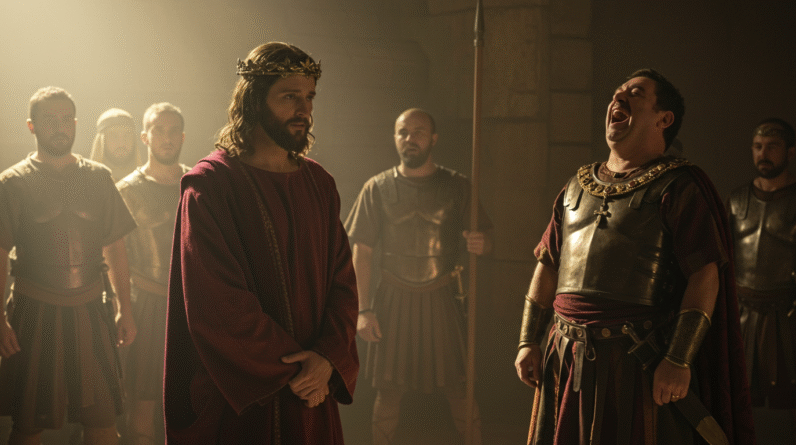The Rise and Fall of Haman: Lessons from the Book of Esther

Have you ever found yourself intrigued by tales of power, downfall, and redemption? The story of Haman in the Bible might just be one of the most fascinating narratives you’ll come across. Set against the backdrop of the Persian Empire, the Book of Esther unfolds like a dramatic play, complete with deceit, heroism, and divine intervention. Here, we’ll explore the enigmatic figure of Haman, tracing his rise to power and his ultimate downfall, and the crucial lessons we can draw from this Biblical story. So, grab a comfortable seat and let’s dive into the unfolding drama of Haman in the Bible.
The Rise of Haman: Ambition and Envy in the Persian Court
Haman, the son of Hammedatha the Agagite, who emerged as an influential figure in the Persian court during the reign of King Xerxes. Appointed as the prime minister, Haman enjoyed a prestige that fuelled his ambition and validated his sense of superiority. He was second only to the king, a position that he believed entitled him to absolute respect and reverence. But, as we know, power often magnifies personal flaws, and in Haman’s case, it was his pride and envy that blazed the trail to his ruin.
Haman’s acrimony was particularly directed toward Mordecai, a Jew who refused to bow before him. This perceived slight became an obsession for Haman, an affront to his dignity that incessantly nagged at his fragile pride. Angered by this, he concocted a plan that went beyond personal vendetta—it was genocidal. The story of Haman in the Bible is not simply about personal ambition; it’s a cautionary tale about the perils of allowing hatred and pride to guide one’s actions.
Starting a Christian blog or ministry website?
Many faith creators choose Hostinger because it’s affordable, fast, and beginner-friendly for WordPress.
The Pervasiveness of Pride
In the story of Haman in the Bible, pride serves as a blindfold, obscuring his vision with delusions of greatness. Pride possesses a dangerous allure, compelling us to make irrational decisions under the illusion of infallibility. Haman was driven by an insatiable hunger for validation, and his need for acknowledgment colored every choice he made. From his determination to eliminate Mordecai to his plot against the Jewish people, Haman’s pride was the undercurrent to his ultimate demise.
And isn’t it human nature to sometimes feel like we need to be recognized and praised? Yet, there’s a profound lesson here: unchecked pride not only blinds us but also alienates us from wisdom and guidance. It creates a chasm between reality and perception, leading us into decisions that might ultimately result in our downfall.
A Web of Hatred: Haman’s Scheme
Haman’s hatred for Mordecai evolved into a scheme against an entire community. With King Xerxes as an unwitting accomplice, Haman meticulously plotted the annihilation of the Jews across the empire. Esther 3:5-6 describes Haman’s fury upon seeing Mordecai’s defiance. Yet, a closer look reveals that Haman’s intent was not just to destroy Mordecai, but to annihilate any semblance of opposition.
His plan was nothing short of chilling, a decree to be executed on a single day. Yet, his scheme was woven with threads of arrogance, assuming the permanence of his power and the victory of his hatred. But when we think we’ve orchestrated the perfect plan, life sometimes has a way of unraveling things—and, in this case, as dramatic and unexpected as any plot twist.
The Power of Divine Timing: Esther’s Rise
Enter Esther, a Jewish woman who had become queen through a serendipitous series of events. Unbeknownst to Haman, Esther’s ascent to royalty was not merely an incident of history, but an unfolding of divine providence. Esther 4:14 captures Mordecai’s profound acceptance of Esther’s role when he tells her, “And who knows but that you have come to your royal position for such a time as this?”
Queen Esther embodies courage, wisdom, and strategic thinking. She seized the right moment to act, aligning her course of action with an understanding of the weight of her influence. Her first-hand knowledge of the court’s dynamics and her courage to reveal her Jewish identity at the right time were crucial in turning tables on Haman.
Mordecai’s Steadfast Loyalty
Meanwhile, Mordecai, Esther’s cousin, exhibited steadfast loyalty and faith. His refusal to bow to Haman was not rooted in rebellion, but in adherence to his faith and identity as a Jew. Mordecai’s actions personified integrity, serving as a silent protest against Haman’s tyranny. You see, loyalty, especially when rooted in principled convictions, doesn’t merely uphold one’s dignity but can also be a catalyst for divine intervention—a key message from the story of Haman in the Bible.
Mordecai’s unwavering nature played a pivotal role, for he not only uncovered a plot against the king but also supported Esther’s brave mission. Esther 6:1-3 illustrates how Mordecai’s previously unrewarded act of loyalty ultimately served as a cornerstone in magnifying the king’s favor toward him, setting the stage for Haman’s humiliation.

Haman’s Downfall: The Reversal of Fortune
The culmination of Haman’s life unfolds with a dramatic reversal of fortunes, akin to a stage curtain being forcefully drawn to reveal an unpalatable truth. Just as he plotted against Mordecai and the Jews, Haman found himself ensnared by the very same decree he sought to implement. Divine irony, wouldn’t you say?
Haman’s end is depicted vividly in Esther 7:9-10, where he is hanged on the gallows he crafted for Mordecai. The symbolism of Haman’s downfall serves as a stark reminder of the inevitable consequences of pride and hate-fueled actions. The narrative not only captures a moralistic end but compels us to reflect on the importance of holding ourselves accountable, lest we fall victim to our own devices.
Lessons Learned: Timeless Insights from Haman’s Story
The story of Haman in the Bible offers insights that stretch beyond biblical times, cascading into the realities we face today. First, the caution against unchecked pride and hatred serves as a moral compass, steering us toward humility and understanding. Pride can create ripple effects, influencing not just our actions but affecting entire communities if left unchecked.
Through Esther and Mordecai, we glimpse the power of faith, courage, and timely action. Their story encourages us to recognize the roles we are meant to play in our own circumstances. Sometimes, you might find yourself uniquely positioned to make a difference, even in ways you hadn’t imagined.
Furthermore, the narrative challenges us to question our judgments, encouraging compassion over rash decisions. After all, mercy and justice often walk hand in hand, and in understanding their balance, we find a path to true wisdom.
Reflection Question:
What personal “Haman-like” pride or bitterness might you need to surrender today? How can Esther’s courage inspire your next step?
Conclusion
The story of Haman in the Bible ignites a poignant exploration of character, choice, and consequence. Within the dramatic rises and falls, heroes and villains, each character’s decision threads through the larger tapestry of fate and divine intention. Haman’s life serves as an evocative narrative on the perilous path of unchecked pride and prejudice, while Esther and Mordecai personify courage, loyalty, and faith.
As we close the chapter on this fascinating story, let it remind us of our own capacity to choose humility and courage over pride and prejudice. For in those choices, we often find the most profound expressions of our humanity.
Explore More
For further reading and encouragement, check out these posts:
👉 7 Bible Verses About Faith in Hard Times
👉 Job’s Faith: What We Can Learn From His Trials
👉 How To Trust God When Everything Falls Apart
👉 Why God Allows Suffering – A Biblical Perspective
👉 Faith Over Fear: How To Stand Strong In Uncertain Seasons
👉 How To Encourage Someone Struggling With Their Faith
👉 5 Prayers for Strength When You’re Feeling Weak

📘 Jesus and the Woman Caught in Adultery – Grace and Mercy Over Judgement
A powerful retelling of John 8:1–11. This book brings to life the depth of forgiveness, mercy, and God’s unwavering love.
👉 Check it now on Amazon
Acknowledgment: All Bible verses referenced in this article were accessed via Bible Gateway (or Bible Hub).
“Want to explore more? Check out our latest post on Why Jesus? and discover the life-changing truth of the Gospel!”
“As a ClickBank, Hostinger Affiliate, I earn from qualifying purchases.”








